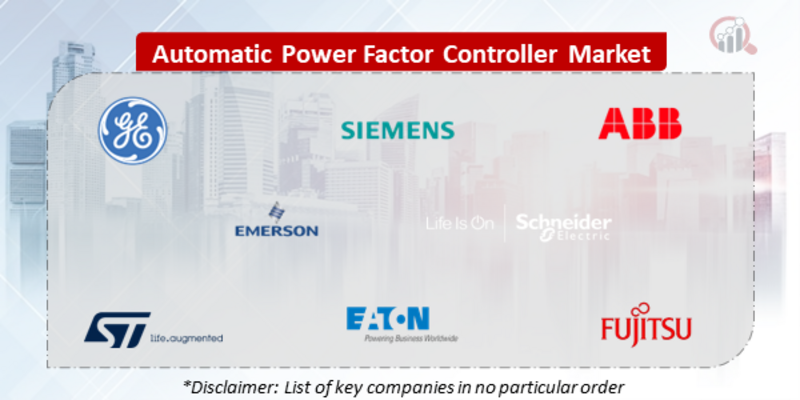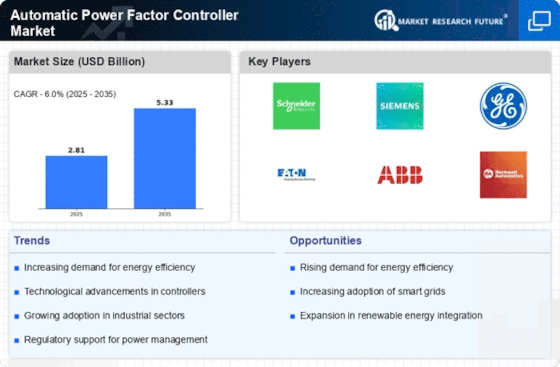Top Industry Leaders in the Automatic Power Factor Controller Market

The Competitive Landscape of Automatic Power Factor Controller Market
In the electrical tango of industrial and commercial facilities, power factor controller (PFC) systems play a crucial role, harmonizing reactive power and voltage waveforms to avoid energy waste and power quality issues. This dynamic market hums with innovation and intense competition, demanding an understanding of the strategies, factors, and players orchestrating its intricate dance.
Key Players:
- General Electric
- Siemens AG
- ABB
- Emerson Electric Co.
- AVEVA Group plc
- Schneider Electric
- STMicroelectronics
- AB POWER SYSTEMS
- Eaton
- Fujitsu
Strategies Adopted by Leaders:
- Technological Prowess: Eaton Corporation and Schneider Electric lead the charge with expertise in high-precision reactive power compensation, advanced control algorithms, and digital monitoring capabilities, catering to large industrial and data center applications.
- Vertical Specialization: ABB Ltd. focuses on compact and user-friendly PFCs for smaller commercial buildings and office spaces, while Siemens AG targets robust and customized solutions for heavy-duty industrial motors and variable speed drives.
- Partnership Play: Mitsubishi Electric Corporation collaborates with energy management consulting firms and utilities, offering integrated solutions and streamlined implementation for customers.
- Open-Source Initiatives and Knowledge Sharing: The Institute of Electrical and Electronics Engineers (IEEE) promotes standardization and best practices in power factor control technology, benefiting the entire industry.
- Focus on Energy Efficiency and Cost Savings: Optimizing reactive power utilization reduces energy consumption, peak demand charges, and improves power quality, securing market share by demonstrating tangible cost benefits.
Factors for Market Share Analysis:
- Performance and Accuracy: Companies offering PFCs with high reactive power compensation accuracy, rapid response times, and reliable operation command premium prices and secure market share by minimizing energy waste and ensuring consistent power quality.
- Versatility and Adaptability: Providing PFCs catering to diverse load types, voltage fluctuations, and harmonic distortion challenges attracts a wider customer base, particularly in facilities with complex electrical systems.
- Ease of Installation and Operation: Offering user-friendly interfaces, remote monitoring capabilities, and readily available technical support simplifies system management and minimizes downtime.
- Cost Competitiveness and Affordability: Balancing advanced features with an attractive price point is crucial for capturing market share, particularly in price-sensitive segments like small businesses and light industrial applications.
- Focus on Sustainability and Green Initiatives: Developing energy-efficient PFCs, using recycled materials, and minimizing environmental impact caters to growing environmental concerns and attracts eco-conscious buyers.
New and Emerging Companies:
- Startups like GridBeyond and EcoFactor: These innovators focus on cloud-based energy management platforms incorporating AI-powered PFC optimization and intelligent demand response programs, catering to the growing demand for smart grid integration and distributed energy resources.
- Academia and Research Labs: Massachusetts Institute of Technology (MIT) and Stanford University explore next-generation technologies like solid-state power electronics and advanced energy storage systems for PFCs, shaping the future of the market.
- Advanced Material Science Innovations: Companies like Dow Chemical and DuPont develop low-loss magnetic core materials and heat-dissipating components for PFCs, improving efficiency and extending lifespan.
Industry Developments:
General Electric (GE):
- October 2023: Launched a new series of compact and modular APFCs for commercial and industrial applications, featuring advanced AI-powered control for optimal performance.
- August 2023: Partnered with a leading utility company to pilot a program integrating smart APFCs with grid communication systems for improved demand management.
Siemens AG:
- October 2023: Introduced a new line of high-efficiency APFCs with integrated harmonic mitigation capabilities, targeting data centers and other sensitive electrical environments.
- August 2023: Collaborated with a research institute to develop next-generation power electronics technologies for even more efficient and compact APFCs.
ABB:
- October 2023: Acquired a small startup specializing in AI-based energy management solutions, aiming to strengthen its APFC portfolio with advanced control capabilities.
- August 2023: Secured a major contract to supply custom-designed APFCs for a large-scale renewable energy project in Europe.









